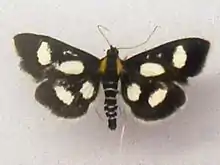Anania funebris
Anania funebris, the white spotted sable, is a species of diurnal dayflying moth of the family Crambidae. It is found in many countries such as Europe, Siberia, the Northern parts of the Far East and North America.
| White spotted sable | |
|---|---|
 | |
 | |
| Scientific classification | |
| Domain: | Eukaryota |
| Kingdom: | Animalia |
| Phylum: | Arthropoda |
| Class: | Insecta |
| Order: | Lepidoptera |
| Family: | Crambidae |
| Genus: | Anania |
| Species: | A. funebris |
| Binomial name | |
| Anania funebris (Ström, 1768) | |
| Synonyms | |
| |
Description
The wingspan is 20–23 mm (0.79-0.92 in). The forewings are black; a large round white subdorsal spot before middle, and a second in disc beyond middle; sometimes a white dot above first; cilia white towards tips. Hindwings as forewings, but without the white dot. The larva is ochreous-whitish; dorsal line deep green; subdorsal and lateral green; spiracular whitish-green; dots green; head whitish-brown.[1]

Behavior
The adults have a tendency to quickly hide behind leaves.[2]
The moth flies from May to September, June and July being the most active in their flight season.
Diet
The larvae feed on leaves of Goldenrod (Solidago) such as Solidago virgaurea. It occasionally feeds on Dyer's Greenweed (Genista tinctoria).[3]
References
- Meyrick, E., 1895 A Handbook of British Lepidoptera MacMillan, London pdf
 This article incorporates text from this source, which is in the public domain. Keys and description
This article incorporates text from this source, which is in the public domain. Keys and description - "White-spotted Sable Moth - Anania funebris". North American Insects & Spiders. Retrieved 2023-06-06.
- "White-spotted Sable". butterfly-conservation.org. Retrieved 2023-06-06.